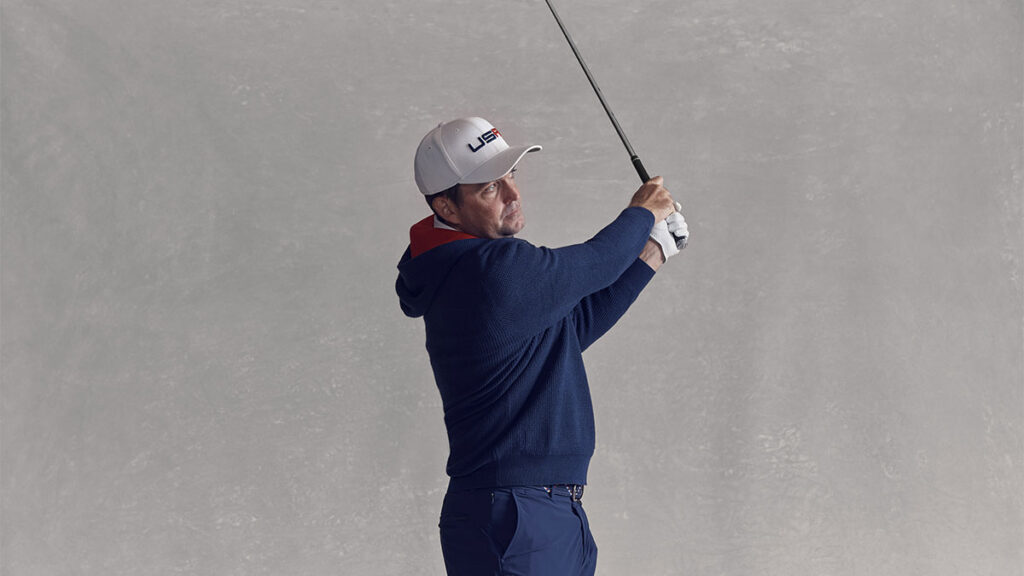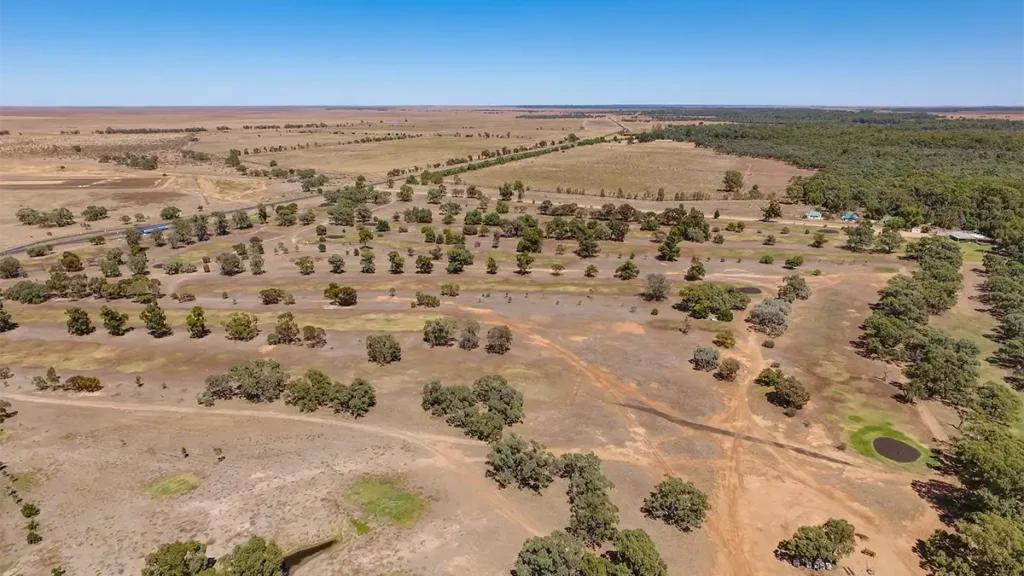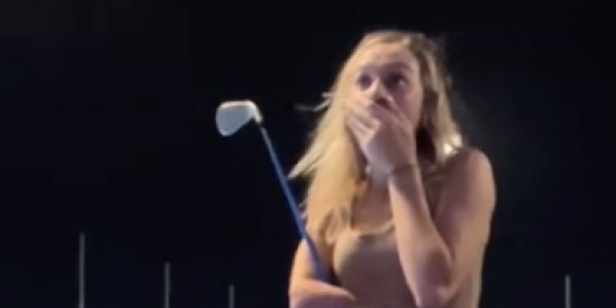US Ryder Cup captain Keegan Bradley on the brink of career definition.
Photographs by Stephen Denton
The answer to why Keegan Bradley was named Ryder Cup captain is buried in a suitcase that has remained sealed for more than a decade. Bradley made a vow never to unpack his luggage from the 2012 Ryder Cup until he was part of a winning American team. This story resurfaced in 2023 when he desperately hoped to make his third US Ryder Cup team – his first since 2014 – only to be snubbed when captain Zach Johnson announced his picks.
The perception exists that as a group, the US players don’t carry the same searing hurt as their European counterparts. Winning is wonderful, but losing means simply shrugging and moving on to the next event. Bradley was the exception.
That’s why Bradley is exactly what Team USA needs. His love for the competition stands in stark contrast to the reported player unrest over money that surfaced on the American side at Marco Simone in 2023, against the broader backdrop of greed that has defined golf’s civil war between the established tours and LIV Golf. The Ryder Cup remains arguably the only time golf achieves true communal appeal. In Bradley, fans have found someone who cares about the Ryder Cup as deeply as they do.
However, Bradley has complicated matters with his remarkable mid-career revival, climbing into the world’s top 10 and capturing the Travelers Championship. When he spoke to Golf Digest in July, the prospect of being a playing captain – the first since Arnold Palmer in 1963 – felt less like possibility than inevitability. This decision adds intrigue and pressure, raising questions about Bradley’s ability to both lead and perform. Where it will take place only amplifies the stakes. Bethpage Black, the course Bradley called home during college, boasts a shaky record when it comes to crowd control.
A lasting memory from Rome was the stark contrast between messages from team leaders. Captain Zach Johnson told his team to “remember who they are”, while European captain Luke Donald instilled in his team the need, in these words relayed by Jon Rahm, “to walk through the gates and doors and forget about who you are outside of this week. What you have done or what you may do afterwards really doesn’t matter.” This latter mindset captures what makes the Ryder Cup special, regardless of outcome. It’s the mindset Bradley will bring – and he has the luggage to prove it.

Golf Digest: Your emotional investment in the Ryder Cup has always been visible, and it’s part of what makes you so beloved by fans, but what about the burden of carrying that passion for more than a decade away from the team?
Keegan Bradley: It’s been tough. I made my first two Ryder Cup teams and thought I was going to play the team events for the rest of my career. Then it got to the point where not only was I not playing in them, but I was nowhere in the conversation. Something that was a huge part of my life, what I wanted to do in the game, I reached this point where I had to let it go and say I might never play in this again. Making peace with that realisation was one of the hardest things I ever had to do.
▶ ▶ ▶
When that call came from the PGA offering the captaincy, was it cathartic, even odd, to dig into something you had buried?
I never expected to be named the Ryder Cup captain. That’s a beyond-your-dreams sort of thing. It was a shock and still is, but I have a great team around me, great vice-captains. This isn’t about me. We’re going to be prepared for what’s coming.
▶ ▶ ▶
What’s one thing about this role that you had no clue about as a player, something that made you think, Oh, this is what captains actually deal with?
I had no idea how much goes into this. I don’t think you can until you get in this position. It’s a 24-hour job. Literally, almost every waking moment, this is on my mind. The only time I’m not thinking about it is when I’m at my real job playing golf. I understand why the role has been given to guys that were sort of at the “done-playing” end of their career. It’s been really challenging, yet also really energising and life-affirming. It’s been great.
▶ ▶ ▶
Juggling all the captain responsibilities while actively competing would seem a likely detriment to one’s game, yet it appears to have had the opposite effect on you.
Well, first off, no one’s really ever been in my position. If you gave this job to Tiger or Phil at my age, they still would’ve been the best players in the world. Maybe part of what has helped me, when I’m outside the ropes not playing, is that I’m focused on the Ryder Cup versus what’s wrong with my game or what I’ve got coming up, a tough hole or some shot I have to hit that week. That, in a weird way, has helped.
▶ ▶ ▶
Building relationships is essential to the role of captain. As much as you might enjoy the added camaraderie, how do you navigate getting closer to players while knowing you might have to look them in the eye and tell them they didn’t make the team?
One of the best parts of the job has been getting to know the guys better. In the back of my mind, I’m always thinking I will be the one to make that call they don’t want to receive, a call I’ve had to receive. That’s especially hard when maybe they’ve been on the previous two or three or even five teams. When making the team becomes normal, you expect it’s coming. I now know why general managers on sports teams don’t get close to players – they might have to trade them, cut them, end their careers. Obviously, it’s not that drastic, but the Ryder Cup is something that can define us as professionals, and I’m the person telling them the dream isn’t coming true this year. I’m a player, too. When I got that call about Rome, I understood that I didn’t make the team on points, and if you leave it up to someone else, it’s always a possibility.
▶ ▶ ▶
After the 2023 Ryder Cup, there was a sense, maybe exacerbated by the Netflix documentary “Full Swing”, that the decision to leave you off was because you weren’t part of this “old boys club”. How true do you think that was and how do you fight against that with your own picks?
No, I don’t think that’s true. What has been lost is this: part of it falls on me. I needed to get to know the guys better. This is a team. You need to have guys under the highest pressure feeling comfortable with one another, to know they can trust the other guy, to know who they are fighting with. You must look at potential pairings. Can this player pair up with three or four guys or can you only play him with this one guy? I totally understood the direction Zach went. He went with proven guys that were major winners, guys who were Ryder Cuppers for the past decade, nothing personal.
▶ ▶ ▶
There’s a lot of respect between you and Luke Donald and the European players. That said, they haven’t been shy about their feelings about you potentially playing, namely the idea that a playing captain in today’s Ryder Cup will do two jobs at 50 percent instead of one at 100 percent. That’s gamesmanship, yet there’s a legitimate debate about whether the captaincy has become too demanding for someone who’s also trying to compete.
When I first started, I didn’t have my five vice-captains (Jim Furyk, Kevin Kisner, Webb Simpson, Brandt Snedeker and Gary Woodland), so I didn’t have that support system. Now that I have these five guys that each bring unique perspectives, opinions and capabilities to the team, it seems much more manageable now. I still think [being a playing-captain] would be very challenging if that’s what happens, but I think it’s much more manageable now with these five guys behind me.
▶ ▶ ▶
What lessons from past Ryder Cup captains do you want to incorporate or avoid?
Just making sure the guys are prepared, and they know who they’re playing with, that they know the plan. Are you going to be called upon for alternate shot or are you only going to be playing best-ball? That we are counting on you or that you might be in reserves. That you’re going to play with this guy that plays this ball. This is our strategy – make it loud and clear and without doubt to everyone in the room. The more guys know and understand those things, the better they’ll play.
▶ ▶ ▶
Eight of the past nine Ryder Cups have been won by the home team. You hope that trend continues this year, obviously, but does the current format need tweaking to have more unpredictability?
That just shows how hard it is to play an away Ryder Cup. Over the past 20, 30 years, the Ryder Cup has changed into this monumental sporting event, something broader and bigger than a golf team, even a major. You’re going into a hostile atmosphere, like going into Fenway Park or a raucous college basketball arena. It’s tough to win in those places, even if you are the better team. That’s sort of what we’ve been dealing with.
▶ ▶ ▶
Speaking of hostile, the last time we had a major at Bethpage, things got heated with some scenes that went beyond typical New York sports passion. Same with several past American-hosted Ryder Cups. You’re going to be responsible for your players’ experience in what could be an incredibly intense environment.
We urge the fans to cheer for our guys. We don’t want them to cross the line. Ultimately, we as the players and the captains, we can’t control a fan that’s in the crowd. We certainly don’t want the fans to affect the play of a player by yelling in their backswing or doing something inappropriate. We would never want that. Having said that, it’s going be a very difficult place to play, just like Rome was for the Americans. That’s what you want as a home team. That’s why you go to a place like Bethpage, where the fans are part of the course’s DNA. The Europeans know that. We know that as Americans, they’re going be tough on us as well. We need to perform and win for them, and that is the focus.
▶ ▶ ▶
As a guy from America’s north-east, being captain at Bethpage must seem too good to be true?
I didn’t get any scholarship offers other than from St John’s University. When I went there, I didn’t know what to expect. I had never really been to New York City, other than in and out as a kid. In college we got to play Bethpage Black every Monday. At that point in my life, I had never played or even seen a major-championship course, and when I got to Bethpage, it was exactly the way I thought a major-championship course would look and feel. Tiger had just won the US Open there. This might sound simple, but at that time I was so extremely grateful to just be in the position. Forget aspirations of being a pro, of being a great college player. I just felt like I belonged to something bigger than myself. To get brought back into this Ryder Cup dream that I thought was gone – at Bethpage? C’mon. That’s why I’m bringing it all. I owe it to my players, to my country, to all the people associated with the course, and I owe it to all the kids who have ever been in or will be in that position.
▶ ▶ ▶
Which American players are you most excited to potentially work with, or for crowds to be introduced to?
Well, there’s J.J. Spaun, who has never played a Ryder Cup or Presidents Cup. He’s the US Open champion, a guy who almost won the Players, but to me, I’m excited because I know what he’s going to get to experience. It’s one thing to play in a Ryder Cup but something else to be a part of this one. [Bethpage Black] is going to be the craziest Ryder Cup ever. I’m excited for Russell Henley. Heck, I still remember everything about my first week, from practice rounds to how nervous I was when it started on Friday. Man, I remember playing a practice round on Tuesday, soaking up the atmosphere, and I was incredibly nervous then. It’s unlike any event you’ll ever feel.
▶ ▶ ▶
How do you define success for your captaincy beyond winning or losing?
It’s just winning. That’s the goal, nothing else. Anything outside of a win is not going to be successful. I want the guys to feel prepared, that we came together as a group, that we are brothers, that I created a week for them at Bethpage they will remember forever, where we had each other’s backs and were one unit. But you do all that because you have an end goal in mind.
▶ ▶ ▶
Is the unpacked suitcase coming to Bethpage?
No. I’m doing whatever I can to not make this Ryder Cup about me. It shouldn’t be about the captain. You hear Bill Belichick talk, he never talks about the coaches. It’s the players that win games. The last thing I want is for the sideshow to be about this stupid suitcase that I didn’t open just because I was depressed. This has nothing to do with me. Even if I play, all I care about is winning. Everything else is stuff that can be left on the side.

Tips from Keegan Bradley
EVERY SHOT STARTS WITH YOUR BREATH
So much about performing well under pressure comes down to breathing. It’s something my coach, Darren May, and I talk about often. Before every round, I do a breathing exercise that takes 10 minutes. If you watch me closely, you’ll notice that the start of my routine before every shot begins by simply placing my hand on my stomach for a brief moment. It’s a reminder to breathe more deeply using my diaphragm rather than just my chest. The idea is to slow your heart rate and get in the right mental space to execute a shot.
NO THOUGHTS AT ADDRESS BUT ONE
I never want to think about swing mechanics over a shot, especially while in contention or during a key moment in a match. That’s not going to work out well for me. After I decide on my target and the shot I’m going to try to hit, I leave all that as I step in, take three looks, and then the ball’s gone. That said, under pressure the tendency among many golfers is to get quick and not complete the backswing. When you practise, think about getting the sternum over your trail knee. That’s a full shoulder turn, and good things happen from here.




HOW TO REALLY TRUST YOUR DISTANCES
The best pressure players won’t vary from their routines for even a second. Scottie Scheffler is a great example. What helps me commit and go is I’m never in doubt about the distance. From practice with a launch monitor, I know how to hit any number based on my system of four swings. While it might not look that different to your eye, my feel for my shortest backswing and through-swing is “chest-to-chest”. For a slightly longer swing that produces a little more distance, the hands rise higher and go “ear-to-ear”. Then I have a 95-percent swing (I nail its numbers most consistently) and, finally, a full-power swing. When I won at Hartford this year, on the final approach I wanted to fly the ball 146 yards. That’s my ear-to-ear 9-iron. Easy.







